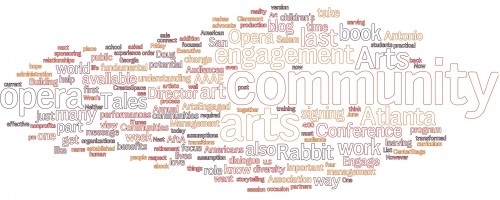
Visitor, audience
Customer, consumer
These are some of the words that we in the museum and performing arts world use to describe those who take advantage of the work we offer the public. Over the last two months of conference immersion I have been hearing and thinking about all of them a good deal. One thing they have in common, from my point of view, is that they separate us from them. With the first two it is understood that they come to us, to “our house.” With the second two, arts world practice is that our “product” is the centerpiece of whatever relationship exists. Of course a good marketer will frame the customer/consumer relationship differently, but the industry mindset leans toward an “art at the center” view of the exchange.
I don’t believe that tendency is because of the language we use. It is simply that the words do not help move us beyond that, and anything that gets in the way of meaningful engagement gets my attention. In addition, I am not particularly critical of the use of these words because we don’t have good alternatives. I’ve been trying to come up with some. However, patron implies an old model that has its own negative connotations; beneficiary is not a lot better than the words we use; community partner, while conveying the right idea, is unwieldy; external stakeholder is similarly cumbersome. Of these, I guess community partner is my favorite, but it does not strike me as the panacea here. I’m eager to hear of alternatives that spring to your mind. In the end, what matters is what we do and how we relate to those outside of the arts establishment.
Regular readers of Engaging Matters will be aware that this post is simply an exploration of words that highlight the issue I raised in Art Is Not Fundamental. I make no apologies. It is my goal here (and elsewhere) to facilitate a transition from the arts world seeing the public as consumer transaction units to seeing the public as peers and partners in arts-based community improvement efforts.
Engage!
Doug
For the curious, the word map in this post came from wordle.net. I got it by providing the URL for this blog. Who knew I wrote so much about opera and . . . rabbits?
